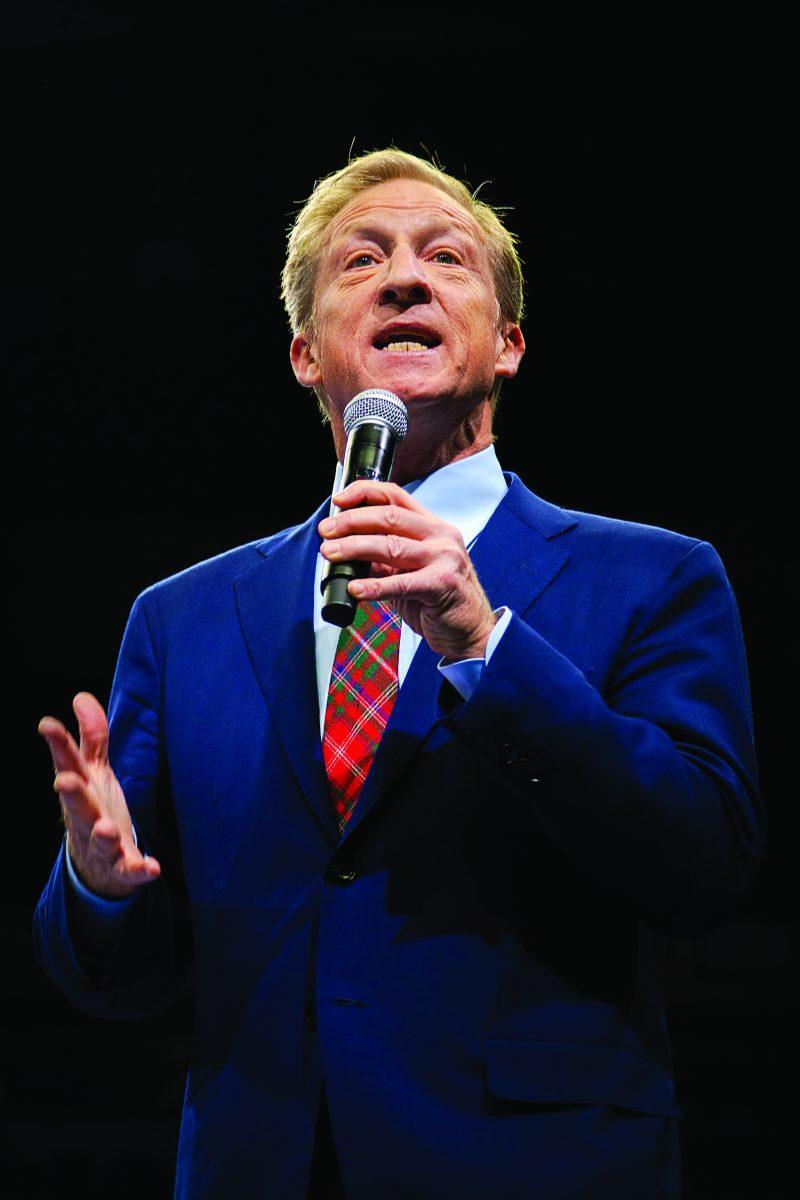COLUMN BY JOHN WINGERT
In one of his first weeks as host of The Late Show, Stephen Colbert played a game with his guest, Donald Trump, trying to pinpoint which of a list of ridiculous quotes Trump had said and which ones Stephen Colbert’s conservative character had said.
Complaints about sending billions to “Bongo Bongo Land,” saying opponents “have the charisma of a damp rag,” and asserting that “politics needs a bit of spicing up” are the sort of over-the-top Trumpian quotes that the United States has come to expect. The only problem is that Donald Trump did not say them. These quotes were all from Nigel Farage and the United Kingdom Independence Party.
As much as the United States has been reeling from Trump’s nativist, anti-globalization, populist message, these sorts of ideas have crystallized into political parties and movements throughout many other Western democracies.
Germany, for example, has the Nationaldemokratische Partei Deutschlands or the National Democratic Party of Germany. It has been the progenitor of such assertions as “due to the continued mass immigration and extraordinarily rising high birth rates especially of non-European populations, illegal foreigners living in Germany further burden the budget.”
Germany has had its share of problems with nationalists. The NDP alone has led protests against refugee houses this year in the wake of continued refugee immigration from the Arab world. They have also continued to say things like, “even now, foreigners are . . . committing felonies such as murder, manslaughter, and rape. The unstoppable Islamization makes this development more explosive.” In response to continuing problems with the NDP, many have tried to get the party banned on constitutional grounds, but it is a very difficult proposal that must be brought before 16 justices in Germany’s highest court.
The National Democratic Party is primarily concerned, first and foremost, with the “survival and continued existence of the German people.” The main way it sees of preserving this national identity is by expelling or prohibiting entry to immigrants, refugees, and asylum seekers. However, it is also important to remember that the NDP wants to strengthen many social welfare programs. They also support more protectionist trade policies to shield Germany from cheaper products that are imported from other countries.
The NDP has been able to gain representation in the provinces of Germany, especially in the northeast, and even in the European Parliament as representatives of Germany at the supranational level. In 1998, the National Democratic Party of Germany only got about 45,000 votes, but in Germany’s most recent national election in 2013, they received over 630,000 votes.
These economic policies combined with strong nativist, anti-immigration tendencies resist a standard right to left dynamic. Instead, most people have labeled these movements as populist. Populism is some sort of movement away from control by elites and instead toward the control of rural, small-town, wholesome peoples that represent their specific country. Populism also tends to support government intervention in some capacity to support specific industries and shield the country from invasive cultural or social values. They are also generally reactions to technological or cultural change.
However, Germany is not the only country in Europe to witness these sorts of populist, traditionalist backlashes. France has similarly experienced a populist movement with strong nativist twinges in its political system. This movement has been represented by the National Front, a party that supports solidarity amongst the “French civilization,” an expansion of social security and healthcare programs, as well as withdrawal from the European Union to foster protectionist policies for French businesses. Their manifesto argues that “ghettos, ethnic conflicts, community demands and politico-religious provocations are the direct consequences of mass immigration which is undermining our national identity and brings with it an increasingly apparent Islamization.”
In France, the National Front has gained representation in both the National Assembly and Senate. Twenty-three of the 74 representatives France sends to the European Parliament, about a third, are members of the National Front. Thousands of regional, general, and municipal council members are also members of France’s National Front party. In 2007, the National Front garnered a little over a million votes, but in their most recent election in 2012, the National Front received over three and a half million votes.
Another, though more tenuous, member of the European Union, Greece, has also seen this same sort of emergence of nationalist populism. The Golden Dawn party in Greece has tried to renew concerns of nationalism, nativism, and anti-globalization ideology. Sporting a jaunty new re-design of the swastika, the Golden Dawn professes, that “nationalism is the only absolute and true revolution because it seeks the birth of new ethical, spiritual, social and mental values.” It also argues that people should fight “exploitative wealth, either local or internationalist.” The Golden Dawn also remains strongly opposed “against the population distortion, because of the millions of illegal immigrants, and the dissolution of the Greek society.”
Like the National Democratic Party and the National Front, this nationalism and economic redistribution for the wholesome and worthy in a country has led the Golden Dawn to some notable successes. They currently have dozens of members in the national parliament and even more at the local level. They also comprise a seventh of Greece’s representation in the European Union’s European Parliament. Additionally, in 2009, the Golden Dawn received only about 20,000 votes and could not gain any representation, but by the most recent of Greece’s many emergency elections in 2015, the Golden Dawn had received almost 380,000 votes.
By now, some patterns should begin to emerge. These parties all share strong anti-immigrant stances and argue for the preservation of their country against foreign intrusions. This nativism does not just apply to wanting to keep out immigrants; it also means that they want to protect native industries by severing trade agreements and raising tariffs against foreign imports. Populist movements like the Golden Dawn, National Front, and NDP also want to strengthen government assistance and social welfare.
All across the Western world, these populist, nativist, anti-globalization movements are springing forth in response to the advancement and change of the new millennium.
Along with the aforementioned parties, are Jobbik in Hungary which desires what they see as the re-establishment of Hungarian nationalism against Gypsy, socialist, and capitalist incursions. There is also the Freedom Party of Austria which wants to “promptly stop immigration and protection [for refugees] instead of providing doors for all.” The Danish People’s Party argues, “Denmark is not a country of immigration and has never been. We will not accept a multi-ethnic transformation of country.” The Polish Law and Justice Party places a strong emphasis on the “Polish family” and rejecting “cultural unification.”
None of these parties are extreme outliers either. They have all done well enough to gain multiple representatives in their national parliament and at the European Parliament level. They are all now sizable political forces in their respective countries.
Now, this movement has crossed the Atlantic. Donald Trump has brought a unique mix of ideals. His comments about Mexican immigrants, building “the greatest wall you’ve ever seen,” and deporting 11 million individuals have become infamous and betray strong anti-immigration twinges in his rhetoric.
In spite of NAFTA and other free trade agreements, Donald Trump has proposed tariffs unheard of in modern times. One of his favorite, stump-speech stories is Ford Motors new plant in Mexico. Trump says, “every car, every truck and every part manufactured in this plant that comes across the border, we’re going to charge you a 35 percent tax — OK?” Trump’s refusal to abide by free trade agreements would likely cause a trade war and untold repercussions in international relations, but it also betrays this strong populist bent in his rhetoric.
Trump also wants to bolster social welfare programs, despite the departure of this position from the conservative mainstream. He said, “every Republican wants to do a big number on Social Security, they want to do it on Medicare, they want to do it on Medicaid. And we can’t do that.”
Donald Trump also says he will bring “winning” back to the presidency. In his pseudo-patriotic style, Trump has consistently emphasized the fact that the American people are good, but we have the misfortune of idiotic leadership. Trump always maintains that the country has the potential to be great again if it returns to some societal roots.
Polls seem to show that this is exactly what people want. It is not misguided conservatives lured into a cult of personality that vote for Trump. His policy proposals, however nascent and unsupported, are what the people want to hear.
Before Trump ever formally entered the political scene, the Tea Party wing of the Republican Party was already leaning strongly toward populism. A Marist poll from 2011 found that 53% of people associating with the Tea Party wanted to raise taxes on those with incomes over $250,000 in an attempt to lower the national debt. The same poll also found that 70% of these supposedly stringent conservatives opposed cuts to Medicare and Medicaid.
This idea of taxing the perceived paper-pushing elites to make room for benefits for the society at large has strong roots in populism. Donald Trump has said repeatedly, “The hedge fund people make a lot of money and they pay very little tax; I want to lower taxes for the middle class.” The same anger that fuels a populist outrage against leeches upon society, often personified in immigrants, produces the same suspicion of wealthy stock market nabobs who create money out of thin air in speculative markets without working to actually produce something.
America’s past can show us similar political movements. In the late nineteenth and early twentieth centuries, a populist party formed in America. Calling itself the People’s Party, in 1892, it issued a call against “the two great classes—tramps and millionaires.” The party supported stronger support for agrarian communities and small towns. Although they had some concrete successes as a political party, they were more successful at influencing the other parties around them at the time. John Temple Graves, an editor for the Atlanta Constitution, wrote in 1896 that, “reforms for which the masses have been clamoring for years—whether it be silver or labor or income tax or popular rights or resistance to government by injunction—had never been written, and might never have been written, into a Democratic platform, until the Populist party, 1,800,000 strong, thundered in the ears of Democratic leaders.”
Donald Trump appeals to this ideal by saying that he will take back power from “special interests, lobbyists and donors.” At every turn, he re-emphasizes the need to turn government into an institution of “winners,” instead of allowing the so-called “losers” governing now to continue to lead Americans astray. He appeals to a select group whom he considers wholesome and good and promises them that the rich will pay more, their benefits will increase, the immigrants will disappear, and the good-natured, idyllic United States that they dream of will return.
In the meantime, Europeans look upon the Trump phenomenon with amusement and underlying concern. The German magazine, Der Spiegel, has called him an “idiot” and representative of “what is wrong with this [the American] system.” The French newspaper, Libération, called him an “American nightmare.” The British newspaper, The Observer, said Trump’s political ideas have “spewed from him like a ruptured sewer.”
Yet, all of these countries have had much more experience with populism at home. Although Donald Trump, in the words of French sociologist and author, Marie-Cécile Naves, is “someone who lets us feel a bit superior about being European,” the persistent laughter is nervous laughter. They may mock him in their publications, but it seems almost wholly due to a reflection of the anti-establishment, nationalist fervor which they know all too well.
Donald Trump may be a character without precedent in modern political memory, but throughout other Western democracies, the same sort of over-the-top, populist ideology asserts itself. In an era of rapid change, technologically and culturally, the backlash is being felt around the globe, and it is a backlash strong enough to bring the most resolute, political bodies to their knees. As much as we may want to, we should not laugh off everything that Donald Trump represents: a populist movement that is revivifying to unseat the most monolithic political traditions around the world.







